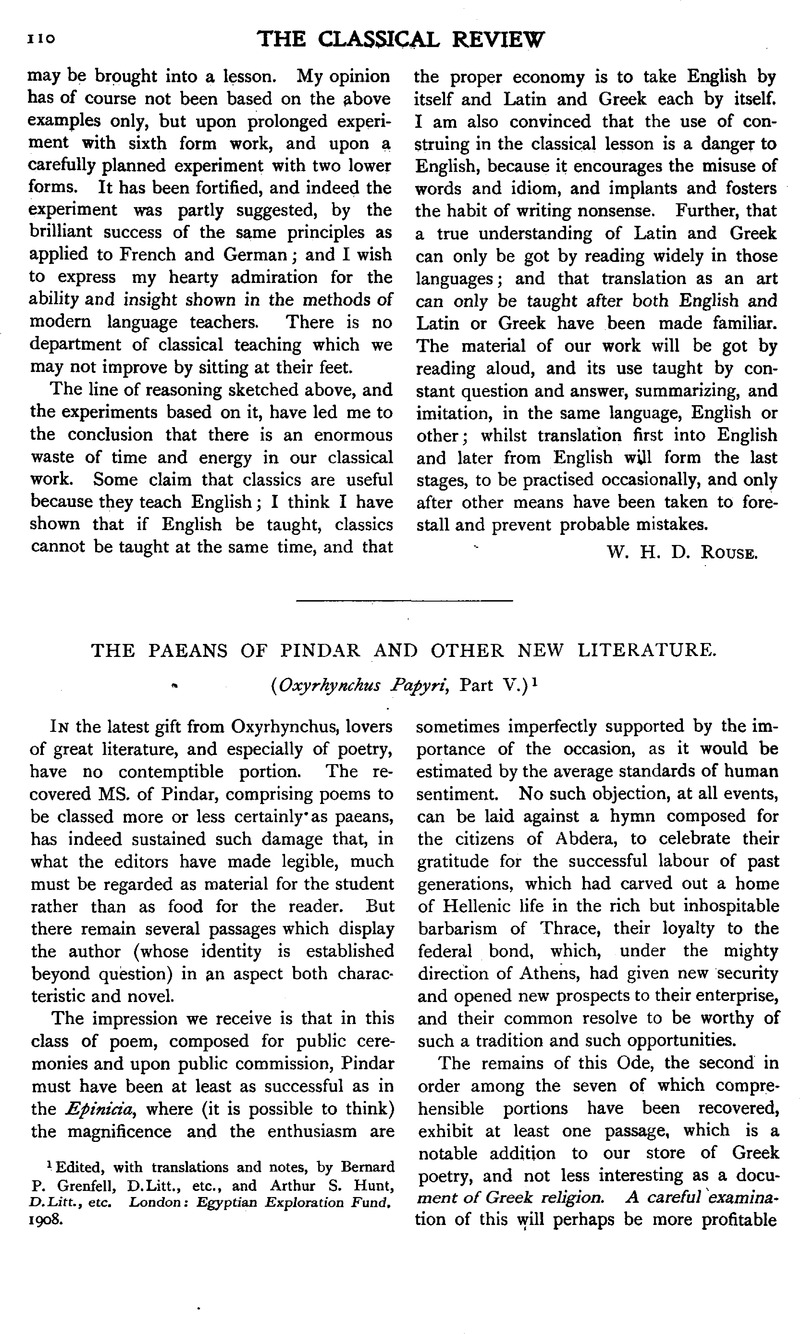No CrossRef data available.
Article contents
The Paeans of Pindar and other New Literature
Published online by Cambridge University Press: 27 October 2009
Abstract

- Type
- Original Contributions
- Information
- Copyright
- Copyright © The Classical Association 1908
References
page 110 note 1 Edited, with translations and notes, by Bernard P. Grenfell, D.Litt., etc., and Arthur S. Hunt, D.Litt., etc. London: Egyptian Exploration Fund. 1908.
page 111 note 1 Oxyrh. Pap. v. p. 29; Poem II. (For the citizens of Abdera), vv. 50 ff.
page 111 note 2 For ⋯⋯ν, ⋯ν: see Editors' note.
page 111 note 3 ![]() (58) is equivalent to
(58) is equivalent to ![]() .—‘The descendant should himself carry to [the ancestors] the praise of a nobly spent life,’ Edd. Papyri, citing Nem. vi. 46 ⋯πε⋯ σφιν κ.τ.λ.; but this seems less simple and appropriate.
.—‘The descendant should himself carry to [the ancestors] the praise of a nobly spent life,’ Edd. Papyri, citing Nem. vi. 46 ⋯πε⋯ σφιν κ.τ.λ.; but this seems less simple and appropriate.
page 112 note 1 Rather, ‘It was the first of the month (when this befell).’ The difference, though small, is not quite immaterial. See hereafter.—The schol. to v, 77, ![]() as given by the editors, points to a prophecy of the battle; but the essential words are a supplement, and rightly marked as doubtful. In any case the note could not be conclusive; the scholia are often plainly wrong.
as given by the editors, points to a prophecy of the battle; but the essential words are a supplement, and rightly marked as doubtful. In any case the note could not be conclusive; the scholia are often plainly wrong.
page 112 note 2 In English, under such circumstances, we generally use the ‘past future’, and say that the things ‘were to’ happen; Greek, which habitually narrates in the present tense (historical), naturally uses (as we also can do) the simple future.
page 112 note 3 It is conceivable that Pindar wrote ποταμ⋯ς (not ποταμῷ) leaving the dative to be supplied, a more common arrangement, but this supposition is not at all necessary. The arrangement actually given is both correct and clear.
page 113 note 1 Anonymous, as here, and with great advantage to the effect, in Homer, 11. 23. 74: the ghost of Patroclus says ![]() —a passage which, by μ⋯σγεσθαι may have suggested Pindar's φ⋯ρσει.
—a passage which, by μ⋯σγεσθαι may have suggested Pindar's φ⋯ρσει.
page 113 note 2 There is perhaps a suggestion of this in the phrase ![]() , which may refer to the preparation by which, according to Virgil, the soul is led to desire the renewal of life.
, which may refer to the preparation by which, according to Virgil, the soul is led to desire the renewal of life.
page 114 note 1 Note the imperfect tense of ἄγγελλε, marking that the message is coincident with the coming of the ‘great host’, and is another aspect of it,—‘Hecate was thereby sending a message.’
page 115 note 1 The editors would substitute ἔπιδον for ἔτεκον but, upon consideration of the purpose, ἔτεκον seems to be necessary.
page 115 note 2 Laws, p. 778 D.
page 115 note 3 Date fixed by reference to Nemean vii.; see below, and the editors' Introduction, p. 20.
page 116 note 1 The practice of Pindar in the Epinicia would admit, quite naturally, the supposition that it is the poet who speaks, identifying himself with his poem and requesting acceptance, nor would this much affect our point. But it does not yet appear, so far as I have observed, that in Paeans he used, or used so freely, this personal manner, less appropriate, if admissible, when his employers were not persons or families, but cities, public bodies, or their deputies appointed for an official performance. An article on this volume in the Berliner Philologische Wochenschrift (Otto Schroeder) cites as examples ![]() (Paean vi. 58) and ⋯κρ⋯νθην (lx. 34), but in both it seems that the choreutes may be the speaker.
(Paean vi. 58) and ⋯κρ⋯νθην (lx. 34), but in both it seems that the choreutes may be the speaker.
page 116 note 2 Poem iv. For the Ceans, to Delos. See the editors' Introduction.
page 116 note 3 supra, p. 11.
page 117 note 1 That the exactions were ‘authorized’, that is to say, authorized by Delphi, must have been assumed by the Aeginetans themselves, and their displeasure can hardly therefore have rested on the mere epithet.
page 117 note 2 The more easily because the slaying of Achilles is previously mentioned in the paean, vv. 81–86.
page 117 note 3  . Prof. Housman, whose reading and punctuation I follow, adopts ἄλλων, with the editors, for the imperfect word. If it was so written, one may suspect it to be an error for some contraction of ⋯μφιπ⋯λων, e.g. αμφλων. As the full word occurs in the text (⋯μφιπ⋯λοις), it could bear abbreviation. The meaning seems to be that the temple-ministers, in pursuance of a bad custom (συν⋯θως), tried to seize the sacrifice of Neoptolemus in satisfaction of alleged dues.
. Prof. Housman, whose reading and punctuation I follow, adopts ἄλλων, with the editors, for the imperfect word. If it was so written, one may suspect it to be an error for some contraction of ⋯μφιπ⋯λων, e.g. αμφλων. As the full word occurs in the text (⋯μφιπ⋯λοις), it could bear abbreviation. The meaning seems to be that the temple-ministers, in pursuance of a bad custom (συν⋯θως), tried to seize the sacrifice of Neoptolemus in satisfaction of alleged dues.




